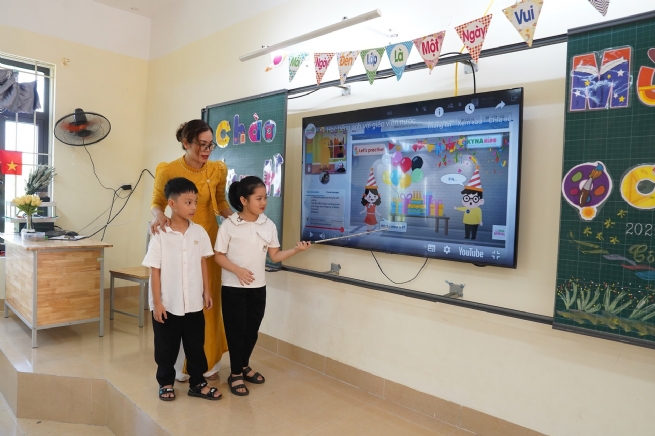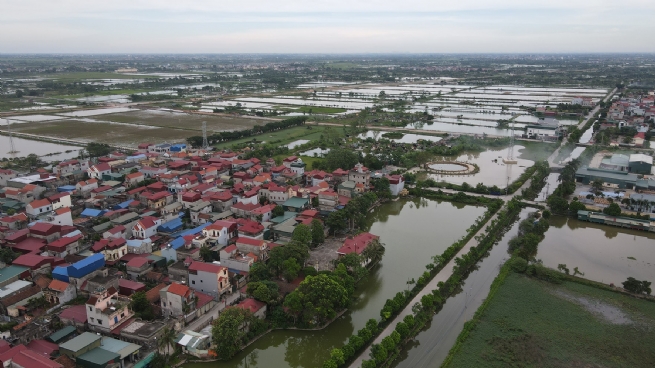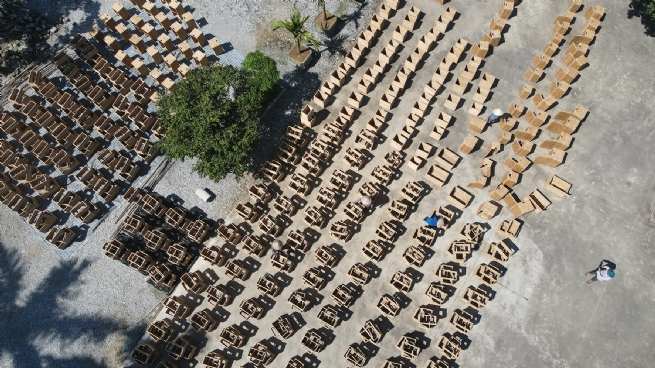Phuong Duc commune, a recognized new rural area of Hanoi, is emerging as a “technology hub” where digital transformation now permeates economic and social life.

Primary school pupils access English through digital platforms
Building a centralized science-culture experience center
Identifying digital transformation as the catalyst for breakthrough growth, Phuong Duc has set the goal of building a centralized science–culture experience center.
“If each school invests in its own laboratory, the costs are huge and the efficiency limited. But by pooling resources to build a shared center, students not only receive standard hands-on training in physics, chemistry, and biology, but also have the opportunity to experience agriculture, traditional crafts, and culture,” Nguyen Trong Vinh, Chairman of the Phuong Duc Commune People’s Committee, said.
This approach both saves investment resources and opens a new path for local education, where “learning goes hand in hand with experience.”
The commune also plans to establish “smart clinics” in the community, enabling residents to connect online with leading professors and doctors at major hospitals. Medical imaging and test results conducted locally can be transmitted instantly, allowing timely diagnosis and consultation. These clinics will also serve as training grounds for local healthcare staff, from case handling to prescribing and patient counseling. Phuong Duc aims to integrate traditional Eastern medicine with modern healthcare, providing comprehensive health services.
In governance, with administrative workloads rising, Phuong Duc has turned to technology to ease the burden on officials. On September 8, 2025, the commune officially launched “Phuong Duc Assistant” on its online portal. This user-friendly digital tool allows residents to access administrative procedures, citizen reception schedules, documents, and events with a single click. Automated responses are fast and accurate, saving time for residents while reducing pressure on civil servants.
The journey of building a digital countryside in Phuong Duc has not been without challenges. Nguyen Tien Dat, Head of the Commune’s Economic Office, pointed out that capital mechanisms remain the greatest hurdle, saying that “The commune has huge demand for investment in modern infrastructure, but without clear decentralization and financial autonomy, plans will face great difficulty. We propose that the city allow communes to retain and reinvest revenues from land. This is not only about capital but also about creating motivation for localities to plan boldly, attract businesses, and leverage internal resources. With enabling mechanisms, we believe Phuong Duc can break through and achieve the goal of becoming a modern new rural commune by 2030.”

Phuong Duc New Rural area
Aspiration to digitize the countryside
In Phuong Duc, the impact of digital transformation tied to new rural development is visible in daily life. According to Dr. Nguyen Dinh Toan of the National Economics University, Phuong Duc serves as a vivid “living laboratory” for combining digital economy theory with rural development practice.
Do Huu Hung, CEO of Accesstrade Vietnam, highlighted that even a suburban commune like Phuong Duc has turned “livestream selling” into a mass movement supported by local infrastructure. This demonstrates that digital transformation is not confined to large corporations with professional teams generating millions of U.S. dollars in revenue. Even in craft villages, from small and medium-sized enterprises to individual producers, e-commerce has enabled revenue breakthroughs. If scaled up, this model could provide a strong boost for tens of thousands of craft villages nationwide to access global markets.
Ta Van Tuong, Deputy Director of the Hanoi Department of Agriculture and Environment, stressed that Phuong Duc’s digital transformation is not just a local initiative but also an important suggestion for the capital’s rural economy. Hanoi’s communes, including Phuong Duc, can form rural start-up models that grow from village-based SMEs and eventually nurture future “national champions.” Lessons from China’s township economy show that when rural areas have room to grow, small enterprises can expand into powerful drivers of national growth. Digital transformation is the key to linking these sectors, improving productivity, expanding markets, and adding value.
Phuong Duc’s model proves that with persistence and timely policy support, Hanoi’s rural areas can become incubators for major future successes.
Experience in Phuong Duc suggests that rural digital transformation must follow a roadmap: starting with broad awareness, helping people get familiar with digital tools in daily life, before focusing resources on high-potential players to drive breakthroughs. This practical lesson can help Hanoi replicate advanced models and ensure that digital transformation becomes not just the story of one commune or region, but a shared strength of the entire city.

Hanoi craft villages
In recent years, Hanoi has issued numerous policies to support communes, cooperatives, SMEs, and households in adopting digital technology across production, processing, promotion, and sales.
Le Minh Hoan, Vice Chairman of the National Assembly, emphasized that building new rural areas in Hanoi should go beyond traditional criteria such as electricity, roads, schools, healthcare, and higher incomes. It must also shoulder the responsibility of preserving culture and heritage in every community. He noted: “For new rural development in Hanoi, we must think big and nurture bold aspirations, even starting from the smallest initiatives at the local level.”
He added that the value of new rural development lies not only in tangible metrics like revenue or digital sales, but even more in intangible outcomes: enabling farmers to tell their own stories, and to share the spirit and values of their villages with a wider community. That is the greatest achievement, making every rural community both a heritage site and a truly livable place.
By Ngoc Dan, Vietnam Business Forum
| This special section is supported by Hanoi Coordination Office of the New Rural Development Program |